Advance Research, Writing and Advocacy: Court of Appeal Case Analysis
VerifiedAdded on 2022/12/23
|12
|2368
|1
Report
AI Summary
This document presents a legal analysis of the case between Western Automotive Pty Ltd and Auto-Franchising Limited, focusing on the appeal to the Supreme Court of New England's Court of Appeal. The appellant challenges the trial judge's interpretation of a franchise agreement, specifically clause 7 concerning commissions on stock sourced from third-party suppliers. The core issues revolve around the application of the parol evidence rule, the principles of judicial review, and the interpretation of the contract's ambiguity. The report examines the relevant facts, including the parties' initial agreement, the terms of the franchise arrangement, and the subsequent dispute over commission payments. The analysis considers the applicability of legal precedents such as Pacific Carriers Ltd v BNP Paribas and Codelfa Construction Pty Ltd v State Rail Authority (NSW), to determine whether the trial judge erred in allowing oral statements and whether clause 7 should have been held unambiguous. The conclusion argues that the case falls under the parol evidence rules and that the negotiations before the written agreement should be declared unambiguous by the court.
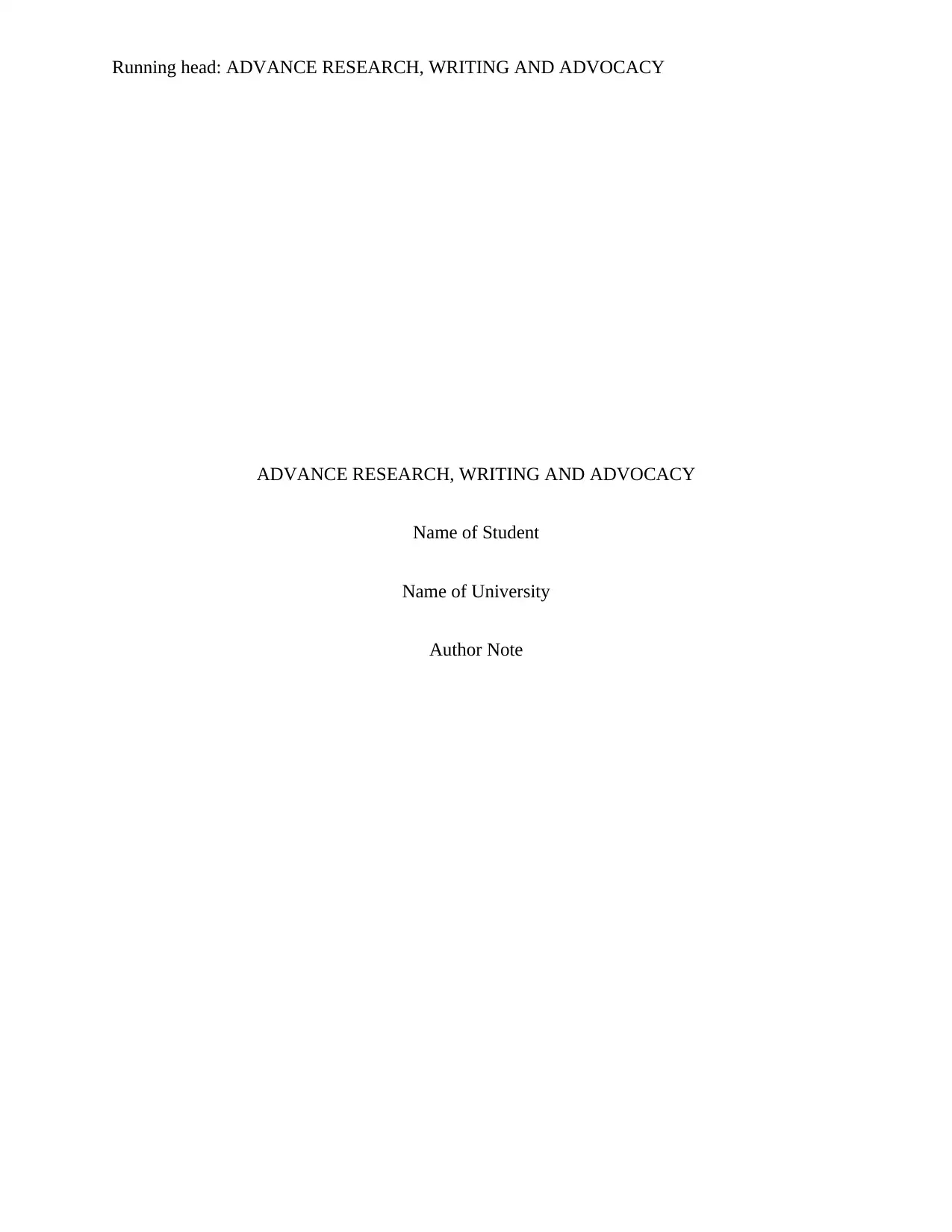
Running head: ADVANCE RESEARCH, WRITING AND ADVOCACY
ADVANCE RESEARCH, WRITING AND ADVOCACY
Name of Student
Name of University
Author Note
ADVANCE RESEARCH, WRITING AND ADVOCACY
Name of Student
Name of University
Author Note
Paraphrase This Document
Need a fresh take? Get an instant paraphrase of this document with our AI Paraphraser
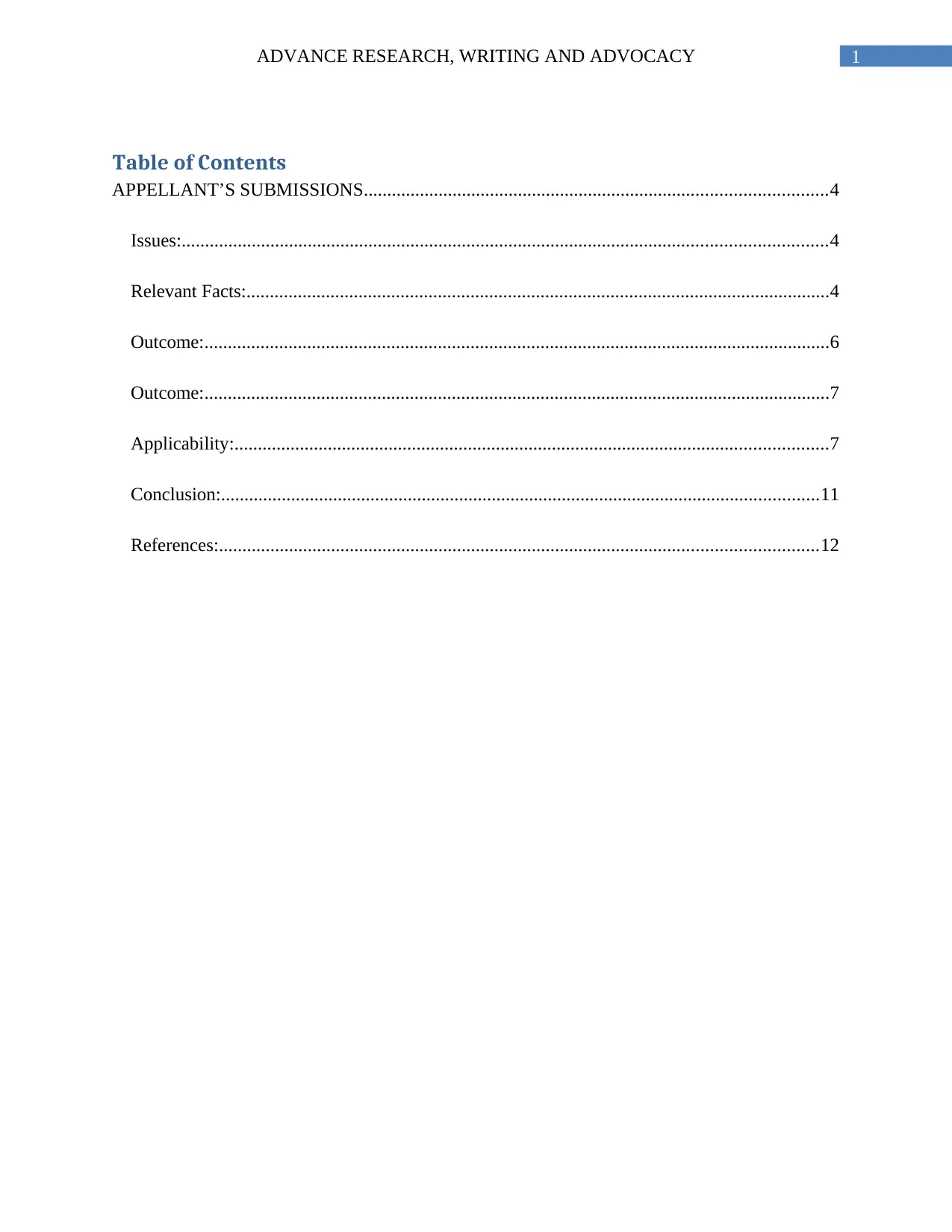
1ADVANCE RESEARCH, WRITING AND ADVOCACY
Table of Contents
APPELLANT’S SUBMISSIONS...................................................................................................4
Issues:..........................................................................................................................................4
Relevant Facts:.............................................................................................................................4
Outcome:......................................................................................................................................6
Outcome:......................................................................................................................................7
Applicability:...............................................................................................................................7
Conclusion:................................................................................................................................11
References:................................................................................................................................12
Table of Contents
APPELLANT’S SUBMISSIONS...................................................................................................4
Issues:..........................................................................................................................................4
Relevant Facts:.............................................................................................................................4
Outcome:......................................................................................................................................6
Outcome:......................................................................................................................................7
Applicability:...............................................................................................................................7
Conclusion:................................................................................................................................11
References:................................................................................................................................12
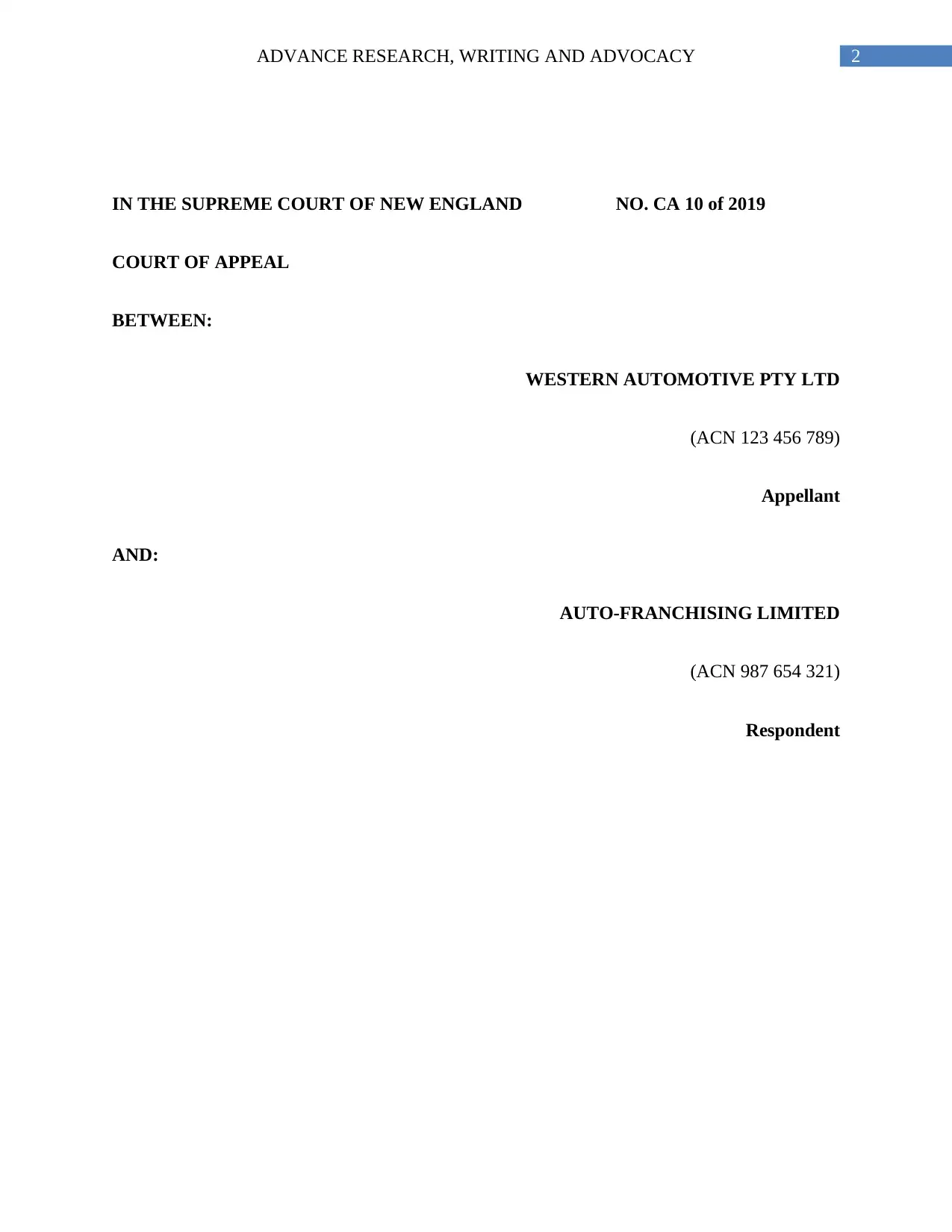
2ADVANCE RESEARCH, WRITING AND ADVOCACY
IN THE SUPREME COURT OF NEW ENGLAND NO. CA 10 of 2019
COURT OF APPEAL
BETWEEN:
WESTERN AUTOMOTIVE PTY LTD
(ACN 123 456 789)
Appellant
AND:
AUTO-FRANCHISING LIMITED
(ACN 987 654 321)
Respondent
IN THE SUPREME COURT OF NEW ENGLAND NO. CA 10 of 2019
COURT OF APPEAL
BETWEEN:
WESTERN AUTOMOTIVE PTY LTD
(ACN 123 456 789)
Appellant
AND:
AUTO-FRANCHISING LIMITED
(ACN 987 654 321)
Respondent
⊘ This is a preview!⊘
Do you want full access?
Subscribe today to unlock all pages.

Trusted by 1+ million students worldwide
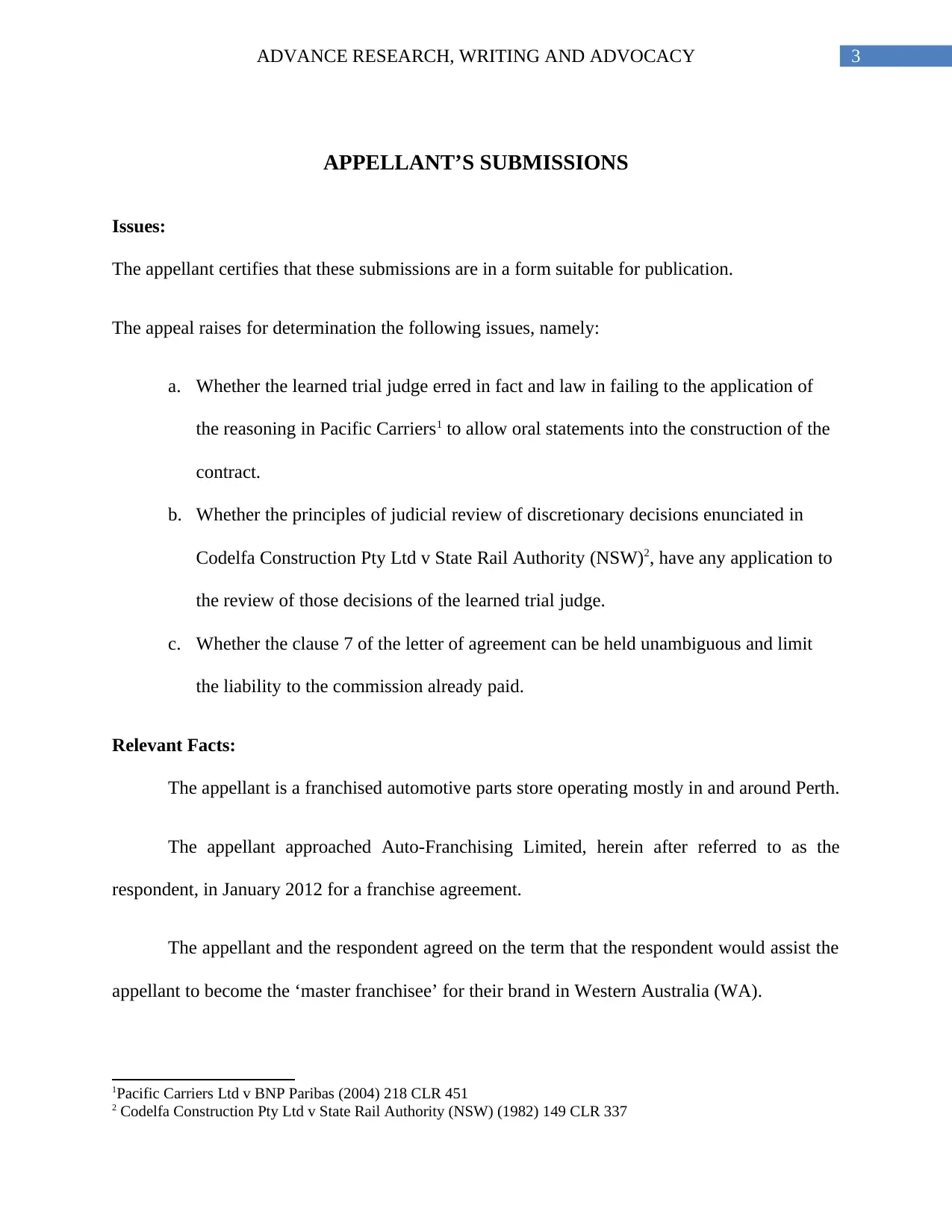
3ADVANCE RESEARCH, WRITING AND ADVOCACY
APPELLANT’S SUBMISSIONS
Issues:
The appellant certifies that these submissions are in a form suitable for publication.
The appeal raises for determination the following issues, namely:
a. Whether the learned trial judge erred in fact and law in failing to the application of
the reasoning in Pacific Carriers1 to allow oral statements into the construction of the
contract.
b. Whether the principles of judicial review of discretionary decisions enunciated in
Codelfa Construction Pty Ltd v State Rail Authority (NSW)2, have any application to
the review of those decisions of the learned trial judge.
c. Whether the clause 7 of the letter of agreement can be held unambiguous and limit
the liability to the commission already paid.
Relevant Facts:
The appellant is a franchised automotive parts store operating mostly in and around Perth.
The appellant approached Auto-Franchising Limited, herein after referred to as the
respondent, in January 2012 for a franchise agreement.
The appellant and the respondent agreed on the term that the respondent would assist the
appellant to become the ‘master franchisee’ for their brand in Western Australia (WA).
1Pacific Carriers Ltd v BNP Paribas (2004) 218 CLR 451
2 Codelfa Construction Pty Ltd v State Rail Authority (NSW) (1982) 149 CLR 337
APPELLANT’S SUBMISSIONS
Issues:
The appellant certifies that these submissions are in a form suitable for publication.
The appeal raises for determination the following issues, namely:
a. Whether the learned trial judge erred in fact and law in failing to the application of
the reasoning in Pacific Carriers1 to allow oral statements into the construction of the
contract.
b. Whether the principles of judicial review of discretionary decisions enunciated in
Codelfa Construction Pty Ltd v State Rail Authority (NSW)2, have any application to
the review of those decisions of the learned trial judge.
c. Whether the clause 7 of the letter of agreement can be held unambiguous and limit
the liability to the commission already paid.
Relevant Facts:
The appellant is a franchised automotive parts store operating mostly in and around Perth.
The appellant approached Auto-Franchising Limited, herein after referred to as the
respondent, in January 2012 for a franchise agreement.
The appellant and the respondent agreed on the term that the respondent would assist the
appellant to become the ‘master franchisee’ for their brand in Western Australia (WA).
1Pacific Carriers Ltd v BNP Paribas (2004) 218 CLR 451
2 Codelfa Construction Pty Ltd v State Rail Authority (NSW) (1982) 149 CLR 337
Paraphrase This Document
Need a fresh take? Get an instant paraphrase of this document with our AI Paraphraser
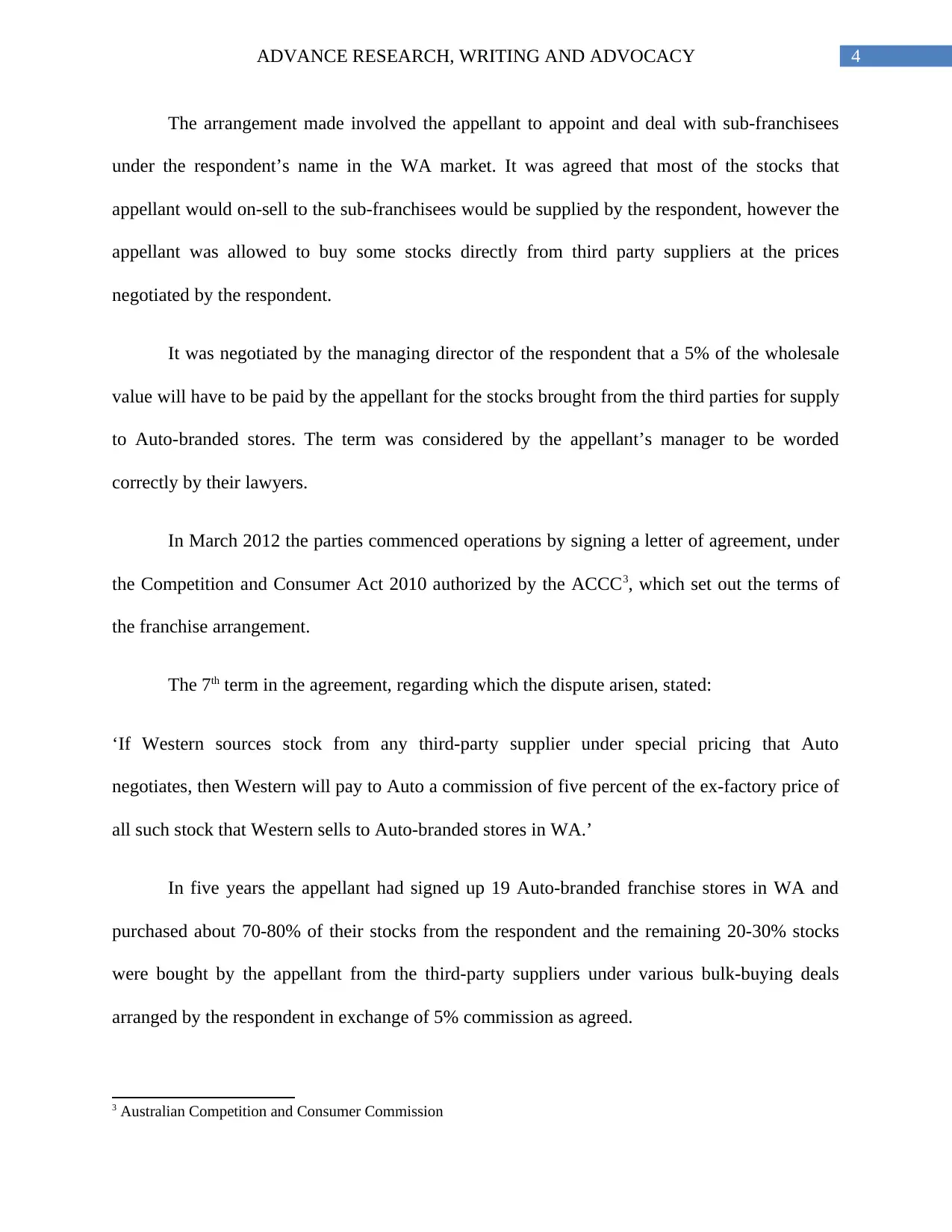
4ADVANCE RESEARCH, WRITING AND ADVOCACY
The arrangement made involved the appellant to appoint and deal with sub-franchisees
under the respondent’s name in the WA market. It was agreed that most of the stocks that
appellant would on-sell to the sub-franchisees would be supplied by the respondent, however the
appellant was allowed to buy some stocks directly from third party suppliers at the prices
negotiated by the respondent.
It was negotiated by the managing director of the respondent that a 5% of the wholesale
value will have to be paid by the appellant for the stocks brought from the third parties for supply
to Auto-branded stores. The term was considered by the appellant’s manager to be worded
correctly by their lawyers.
In March 2012 the parties commenced operations by signing a letter of agreement, under
the Competition and Consumer Act 2010 authorized by the ACCC3, which set out the terms of
the franchise arrangement.
The 7th term in the agreement, regarding which the dispute arisen, stated:
‘If Western sources stock from any third-party supplier under special pricing that Auto
negotiates, then Western will pay to Auto a commission of five percent of the ex-factory price of
all such stock that Western sells to Auto-branded stores in WA.’
In five years the appellant had signed up 19 Auto-branded franchise stores in WA and
purchased about 70-80% of their stocks from the respondent and the remaining 20-30% stocks
were bought by the appellant from the third-party suppliers under various bulk-buying deals
arranged by the respondent in exchange of 5% commission as agreed.
3 Australian Competition and Consumer Commission
The arrangement made involved the appellant to appoint and deal with sub-franchisees
under the respondent’s name in the WA market. It was agreed that most of the stocks that
appellant would on-sell to the sub-franchisees would be supplied by the respondent, however the
appellant was allowed to buy some stocks directly from third party suppliers at the prices
negotiated by the respondent.
It was negotiated by the managing director of the respondent that a 5% of the wholesale
value will have to be paid by the appellant for the stocks brought from the third parties for supply
to Auto-branded stores. The term was considered by the appellant’s manager to be worded
correctly by their lawyers.
In March 2012 the parties commenced operations by signing a letter of agreement, under
the Competition and Consumer Act 2010 authorized by the ACCC3, which set out the terms of
the franchise arrangement.
The 7th term in the agreement, regarding which the dispute arisen, stated:
‘If Western sources stock from any third-party supplier under special pricing that Auto
negotiates, then Western will pay to Auto a commission of five percent of the ex-factory price of
all such stock that Western sells to Auto-branded stores in WA.’
In five years the appellant had signed up 19 Auto-branded franchise stores in WA and
purchased about 70-80% of their stocks from the respondent and the remaining 20-30% stocks
were bought by the appellant from the third-party suppliers under various bulk-buying deals
arranged by the respondent in exchange of 5% commission as agreed.
3 Australian Competition and Consumer Commission
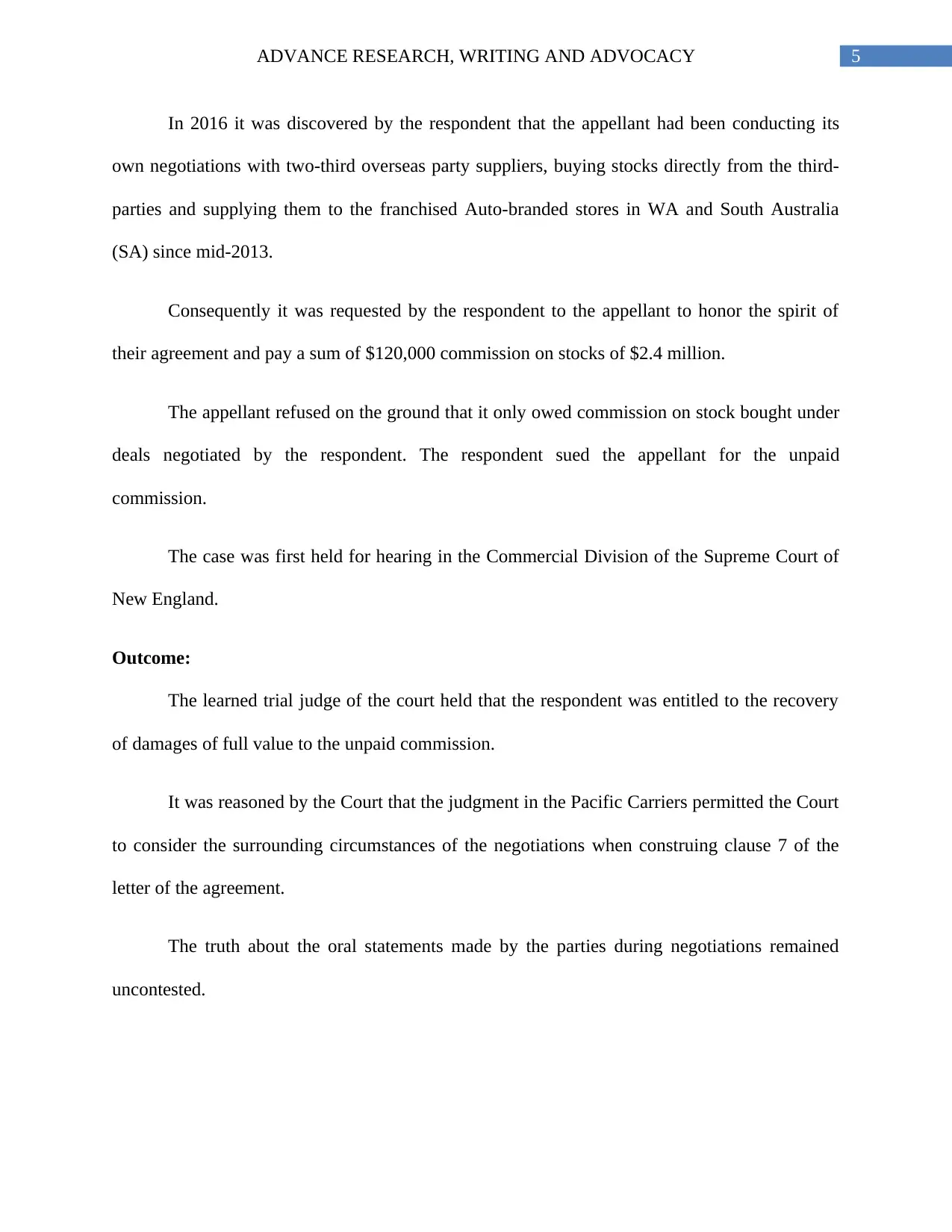
5ADVANCE RESEARCH, WRITING AND ADVOCACY
In 2016 it was discovered by the respondent that the appellant had been conducting its
own negotiations with two-third overseas party suppliers, buying stocks directly from the third-
parties and supplying them to the franchised Auto-branded stores in WA and South Australia
(SA) since mid-2013.
Consequently it was requested by the respondent to the appellant to honor the spirit of
their agreement and pay a sum of $120,000 commission on stocks of $2.4 million.
The appellant refused on the ground that it only owed commission on stock bought under
deals negotiated by the respondent. The respondent sued the appellant for the unpaid
commission.
The case was first held for hearing in the Commercial Division of the Supreme Court of
New England.
Outcome:
The learned trial judge of the court held that the respondent was entitled to the recovery
of damages of full value to the unpaid commission.
It was reasoned by the Court that the judgment in the Pacific Carriers permitted the Court
to consider the surrounding circumstances of the negotiations when construing clause 7 of the
letter of the agreement.
The truth about the oral statements made by the parties during negotiations remained
uncontested.
In 2016 it was discovered by the respondent that the appellant had been conducting its
own negotiations with two-third overseas party suppliers, buying stocks directly from the third-
parties and supplying them to the franchised Auto-branded stores in WA and South Australia
(SA) since mid-2013.
Consequently it was requested by the respondent to the appellant to honor the spirit of
their agreement and pay a sum of $120,000 commission on stocks of $2.4 million.
The appellant refused on the ground that it only owed commission on stock bought under
deals negotiated by the respondent. The respondent sued the appellant for the unpaid
commission.
The case was first held for hearing in the Commercial Division of the Supreme Court of
New England.
Outcome:
The learned trial judge of the court held that the respondent was entitled to the recovery
of damages of full value to the unpaid commission.
It was reasoned by the Court that the judgment in the Pacific Carriers permitted the Court
to consider the surrounding circumstances of the negotiations when construing clause 7 of the
letter of the agreement.
The truth about the oral statements made by the parties during negotiations remained
uncontested.
⊘ This is a preview!⊘
Do you want full access?
Subscribe today to unlock all pages.

Trusted by 1+ million students worldwide
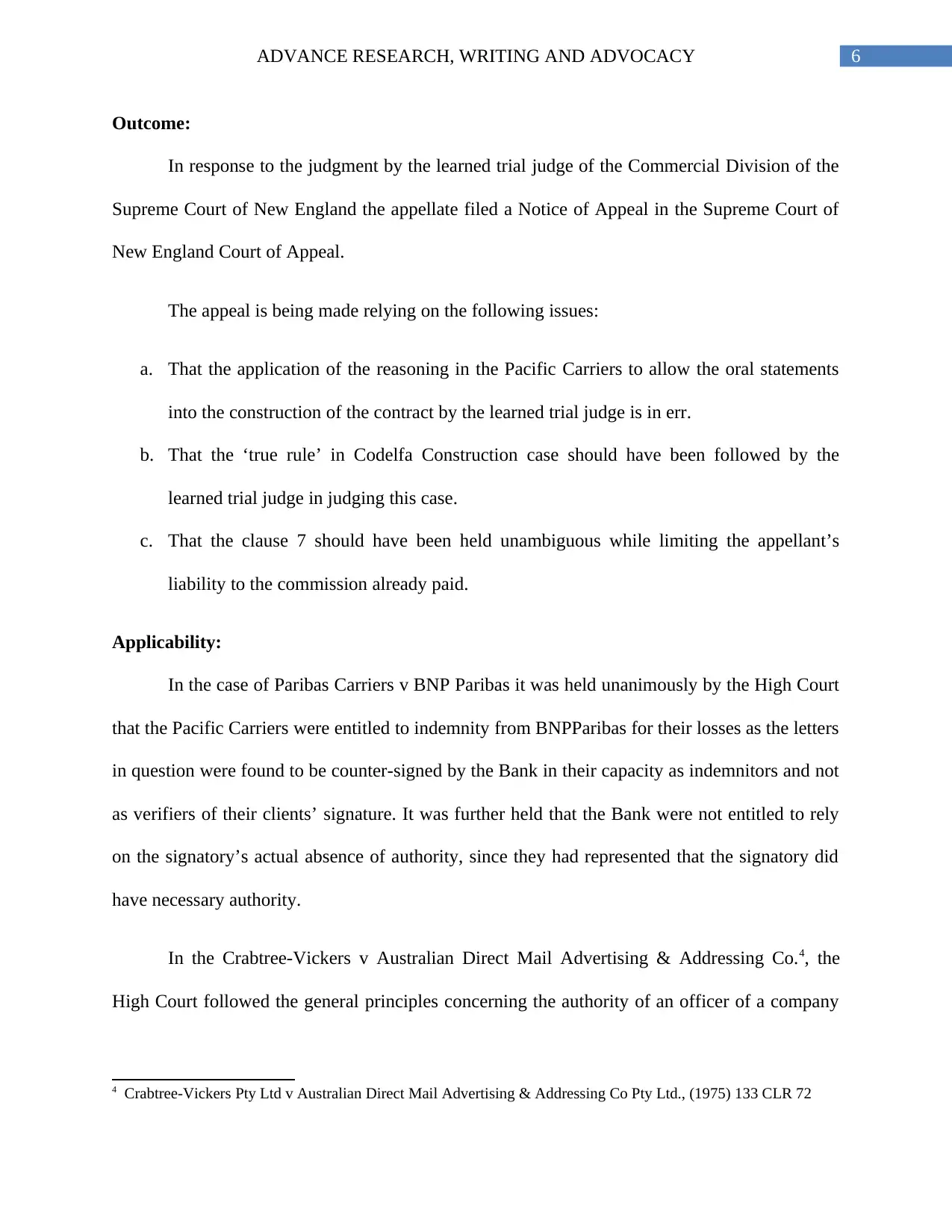
6ADVANCE RESEARCH, WRITING AND ADVOCACY
Outcome:
In response to the judgment by the learned trial judge of the Commercial Division of the
Supreme Court of New England the appellate filed a Notice of Appeal in the Supreme Court of
New England Court of Appeal.
The appeal is being made relying on the following issues:
a. That the application of the reasoning in the Pacific Carriers to allow the oral statements
into the construction of the contract by the learned trial judge is in err.
b. That the ‘true rule’ in Codelfa Construction case should have been followed by the
learned trial judge in judging this case.
c. That the clause 7 should have been held unambiguous while limiting the appellant’s
liability to the commission already paid.
Applicability:
In the case of Paribas Carriers v BNP Paribas it was held unanimously by the High Court
that the Pacific Carriers were entitled to indemnity from BNPParibas for their losses as the letters
in question were found to be counter-signed by the Bank in their capacity as indemnitors and not
as verifiers of their clients’ signature. It was further held that the Bank were not entitled to rely
on the signatory’s actual absence of authority, since they had represented that the signatory did
have necessary authority.
In the Crabtree-Vickers v Australian Direct Mail Advertising & Addressing Co.4, the
High Court followed the general principles concerning the authority of an officer of a company
4 Crabtree-Vickers Pty Ltd v Australian Direct Mail Advertising & Addressing Co Pty Ltd., (1975) 133 CLR 72
Outcome:
In response to the judgment by the learned trial judge of the Commercial Division of the
Supreme Court of New England the appellate filed a Notice of Appeal in the Supreme Court of
New England Court of Appeal.
The appeal is being made relying on the following issues:
a. That the application of the reasoning in the Pacific Carriers to allow the oral statements
into the construction of the contract by the learned trial judge is in err.
b. That the ‘true rule’ in Codelfa Construction case should have been followed by the
learned trial judge in judging this case.
c. That the clause 7 should have been held unambiguous while limiting the appellant’s
liability to the commission already paid.
Applicability:
In the case of Paribas Carriers v BNP Paribas it was held unanimously by the High Court
that the Pacific Carriers were entitled to indemnity from BNPParibas for their losses as the letters
in question were found to be counter-signed by the Bank in their capacity as indemnitors and not
as verifiers of their clients’ signature. It was further held that the Bank were not entitled to rely
on the signatory’s actual absence of authority, since they had represented that the signatory did
have necessary authority.
In the Crabtree-Vickers v Australian Direct Mail Advertising & Addressing Co.4, the
High Court followed the general principles concerning the authority of an officer of a company
4 Crabtree-Vickers Pty Ltd v Australian Direct Mail Advertising & Addressing Co Pty Ltd., (1975) 133 CLR 72
Paraphrase This Document
Need a fresh take? Get an instant paraphrase of this document with our AI Paraphraser
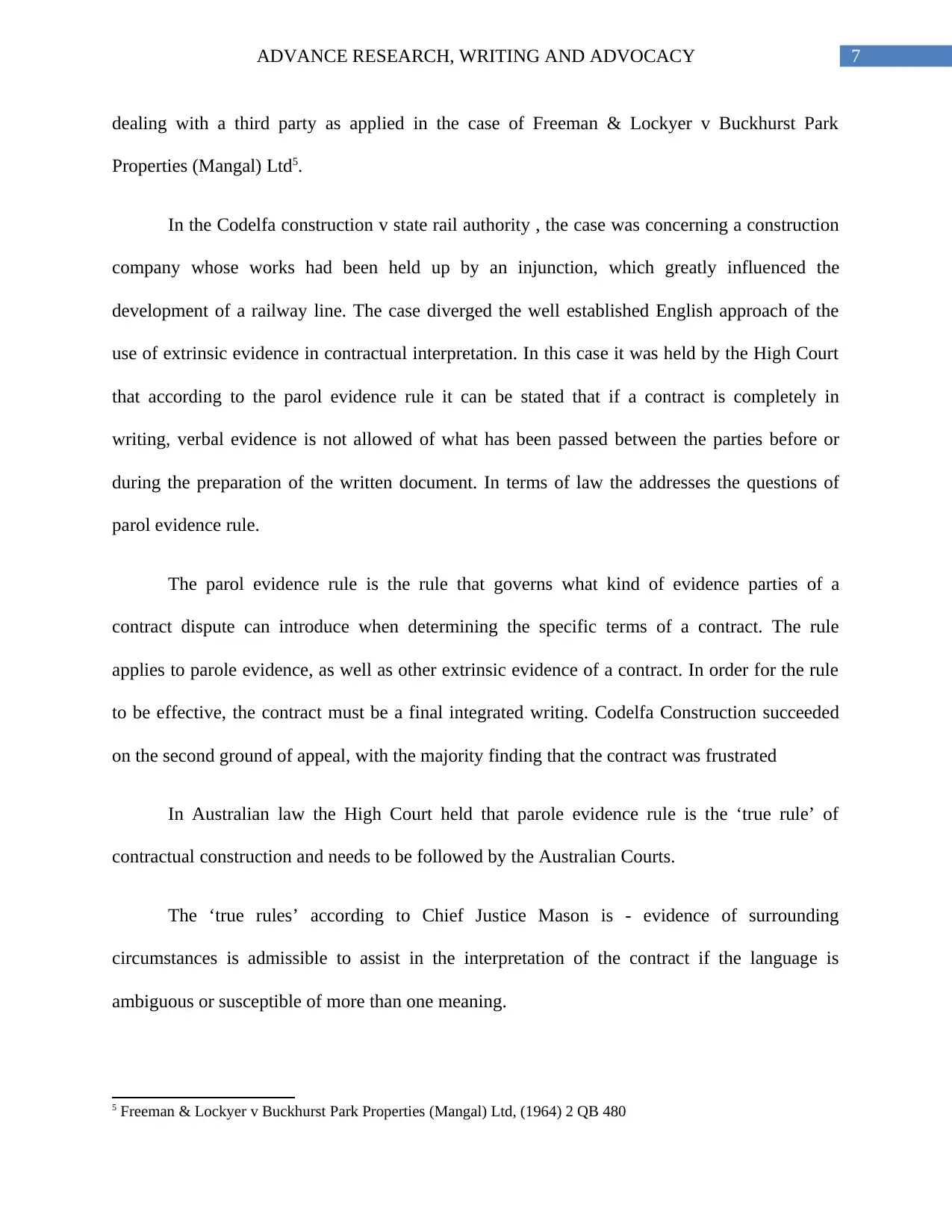
7ADVANCE RESEARCH, WRITING AND ADVOCACY
dealing with a third party as applied in the case of Freeman & Lockyer v Buckhurst Park
Properties (Mangal) Ltd5.
In the Codelfa construction v state rail authority , the case was concerning a construction
company whose works had been held up by an injunction, which greatly influenced the
development of a railway line. The case diverged the well established English approach of the
use of extrinsic evidence in contractual interpretation. In this case it was held by the High Court
that according to the parol evidence rule it can be stated that if a contract is completely in
writing, verbal evidence is not allowed of what has been passed between the parties before or
during the preparation of the written document. In terms of law the addresses the questions of
parol evidence rule.
The parol evidence rule is the rule that governs what kind of evidence parties of a
contract dispute can introduce when determining the specific terms of a contract. The rule
applies to parole evidence, as well as other extrinsic evidence of a contract. In order for the rule
to be effective, the contract must be a final integrated writing. Codelfa Construction succeeded
on the second ground of appeal, with the majority finding that the contract was frustrated
In Australian law the High Court held that parole evidence rule is the ‘true rule’ of
contractual construction and needs to be followed by the Australian Courts.
The ‘true rules’ according to Chief Justice Mason is - evidence of surrounding
circumstances is admissible to assist in the interpretation of the contract if the language is
ambiguous or susceptible of more than one meaning.
5 Freeman & Lockyer v Buckhurst Park Properties (Mangal) Ltd, (1964) 2 QB 480
dealing with a third party as applied in the case of Freeman & Lockyer v Buckhurst Park
Properties (Mangal) Ltd5.
In the Codelfa construction v state rail authority , the case was concerning a construction
company whose works had been held up by an injunction, which greatly influenced the
development of a railway line. The case diverged the well established English approach of the
use of extrinsic evidence in contractual interpretation. In this case it was held by the High Court
that according to the parol evidence rule it can be stated that if a contract is completely in
writing, verbal evidence is not allowed of what has been passed between the parties before or
during the preparation of the written document. In terms of law the addresses the questions of
parol evidence rule.
The parol evidence rule is the rule that governs what kind of evidence parties of a
contract dispute can introduce when determining the specific terms of a contract. The rule
applies to parole evidence, as well as other extrinsic evidence of a contract. In order for the rule
to be effective, the contract must be a final integrated writing. Codelfa Construction succeeded
on the second ground of appeal, with the majority finding that the contract was frustrated
In Australian law the High Court held that parole evidence rule is the ‘true rule’ of
contractual construction and needs to be followed by the Australian Courts.
The ‘true rules’ according to Chief Justice Mason is - evidence of surrounding
circumstances is admissible to assist in the interpretation of the contract if the language is
ambiguous or susceptible of more than one meaning.
5 Freeman & Lockyer v Buckhurst Park Properties (Mangal) Ltd, (1964) 2 QB 480
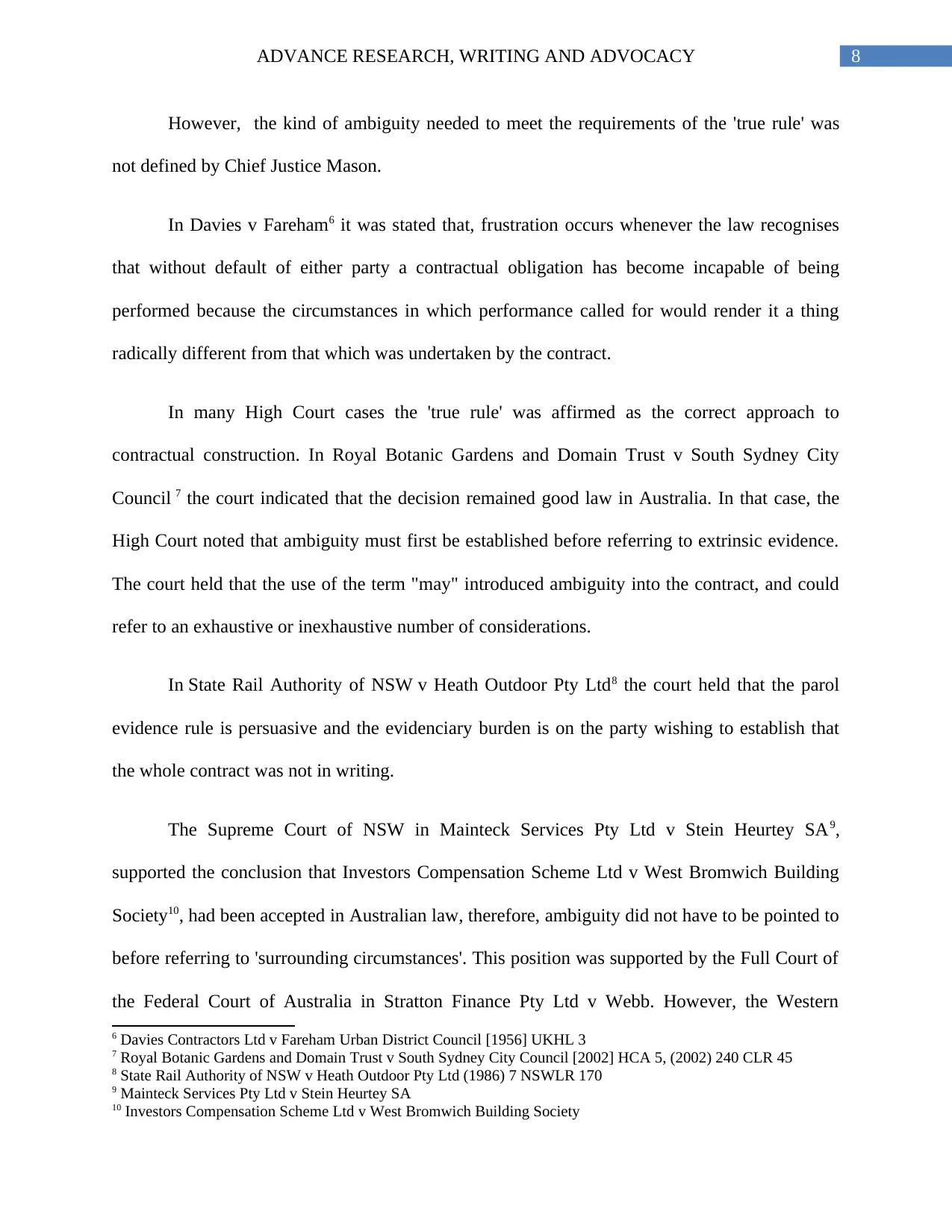
8ADVANCE RESEARCH, WRITING AND ADVOCACY
However, the kind of ambiguity needed to meet the requirements of the 'true rule' was
not defined by Chief Justice Mason.
In Davies v Fareham6 it was stated that, frustration occurs whenever the law recognises
that without default of either party a contractual obligation has become incapable of being
performed because the circumstances in which performance called for would render it a thing
radically different from that which was undertaken by the contract.
In many High Court cases the 'true rule' was affirmed as the correct approach to
contractual construction. In Royal Botanic Gardens and Domain Trust v South Sydney City
Council 7 the court indicated that the decision remained good law in Australia. In that case, the
High Court noted that ambiguity must first be established before referring to extrinsic evidence.
The court held that the use of the term "may" introduced ambiguity into the contract, and could
refer to an exhaustive or inexhaustive number of considerations.
In State Rail Authority of NSW v Heath Outdoor Pty Ltd8 the court held that the parol
evidence rule is persuasive and the evidenciary burden is on the party wishing to establish that
the whole contract was not in writing.
The Supreme Court of NSW in Mainteck Services Pty Ltd v Stein Heurtey SA9,
supported the conclusion that Investors Compensation Scheme Ltd v West Bromwich Building
Society10, had been accepted in Australian law, therefore, ambiguity did not have to be pointed to
before referring to 'surrounding circumstances'. This position was supported by the Full Court of
the Federal Court of Australia in Stratton Finance Pty Ltd v Webb. However, the Western
6 Davies Contractors Ltd v Fareham Urban District Council [1956] UKHL 3
7 Royal Botanic Gardens and Domain Trust v South Sydney City Council [2002] HCA 5, (2002) 240 CLR 45
8 State Rail Authority of NSW v Heath Outdoor Pty Ltd (1986) 7 NSWLR 170
9 Mainteck Services Pty Ltd v Stein Heurtey SA
10 Investors Compensation Scheme Ltd v West Bromwich Building Society
However, the kind of ambiguity needed to meet the requirements of the 'true rule' was
not defined by Chief Justice Mason.
In Davies v Fareham6 it was stated that, frustration occurs whenever the law recognises
that without default of either party a contractual obligation has become incapable of being
performed because the circumstances in which performance called for would render it a thing
radically different from that which was undertaken by the contract.
In many High Court cases the 'true rule' was affirmed as the correct approach to
contractual construction. In Royal Botanic Gardens and Domain Trust v South Sydney City
Council 7 the court indicated that the decision remained good law in Australia. In that case, the
High Court noted that ambiguity must first be established before referring to extrinsic evidence.
The court held that the use of the term "may" introduced ambiguity into the contract, and could
refer to an exhaustive or inexhaustive number of considerations.
In State Rail Authority of NSW v Heath Outdoor Pty Ltd8 the court held that the parol
evidence rule is persuasive and the evidenciary burden is on the party wishing to establish that
the whole contract was not in writing.
The Supreme Court of NSW in Mainteck Services Pty Ltd v Stein Heurtey SA9,
supported the conclusion that Investors Compensation Scheme Ltd v West Bromwich Building
Society10, had been accepted in Australian law, therefore, ambiguity did not have to be pointed to
before referring to 'surrounding circumstances'. This position was supported by the Full Court of
the Federal Court of Australia in Stratton Finance Pty Ltd v Webb. However, the Western
6 Davies Contractors Ltd v Fareham Urban District Council [1956] UKHL 3
7 Royal Botanic Gardens and Domain Trust v South Sydney City Council [2002] HCA 5, (2002) 240 CLR 45
8 State Rail Authority of NSW v Heath Outdoor Pty Ltd (1986) 7 NSWLR 170
9 Mainteck Services Pty Ltd v Stein Heurtey SA
10 Investors Compensation Scheme Ltd v West Bromwich Building Society
⊘ This is a preview!⊘
Do you want full access?
Subscribe today to unlock all pages.

Trusted by 1+ million students worldwide
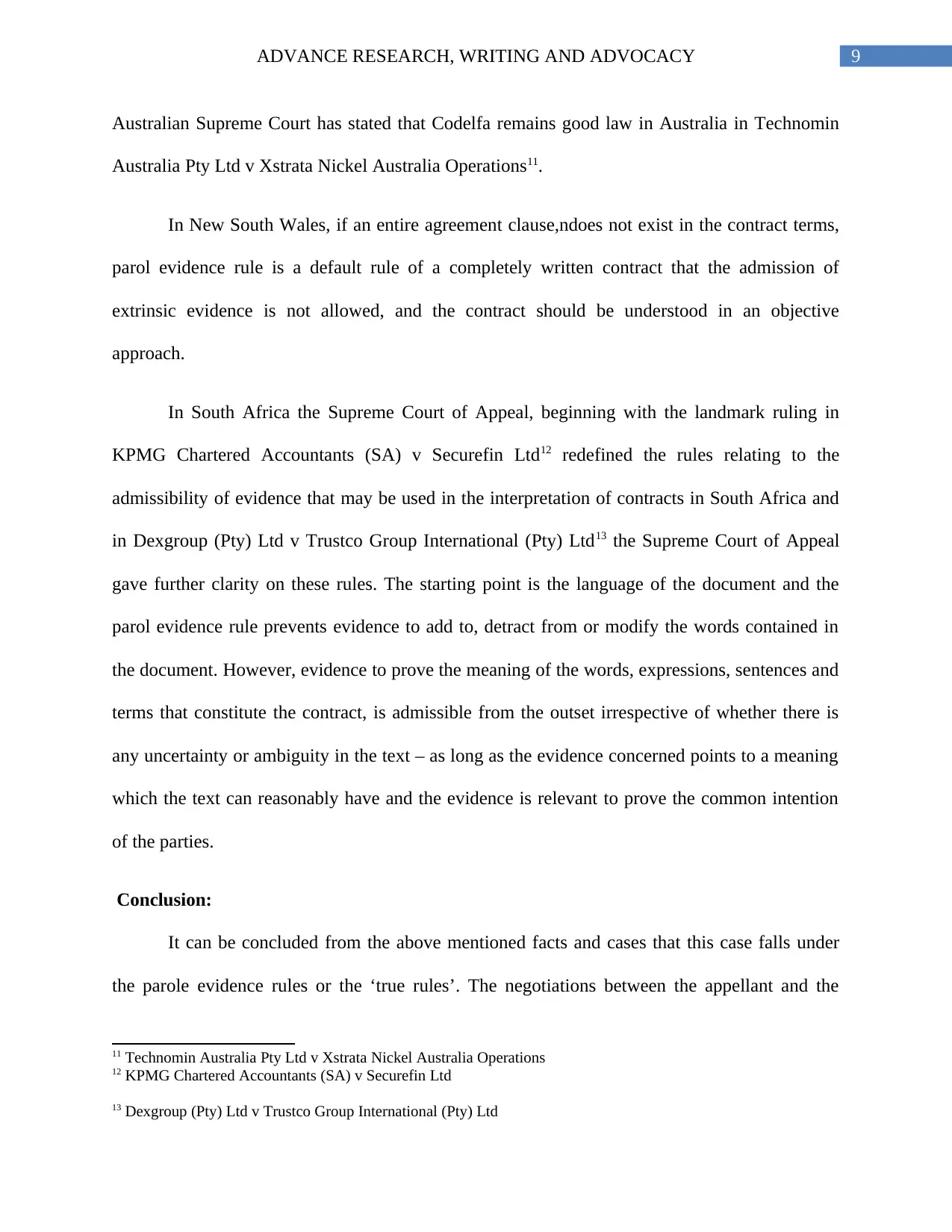
9ADVANCE RESEARCH, WRITING AND ADVOCACY
Australian Supreme Court has stated that Codelfa remains good law in Australia in Technomin
Australia Pty Ltd v Xstrata Nickel Australia Operations11.
In New South Wales, if an entire agreement clause,ndoes not exist in the contract terms,
parol evidence rule is a default rule of a completely written contract that the admission of
extrinsic evidence is not allowed, and the contract should be understood in an objective
approach.
In South Africa the Supreme Court of Appeal, beginning with the landmark ruling in
KPMG Chartered Accountants (SA) v Securefin Ltd12 redefined the rules relating to the
admissibility of evidence that may be used in the interpretation of contracts in South Africa and
in Dexgroup (Pty) Ltd v Trustco Group International (Pty) Ltd13 the Supreme Court of Appeal
gave further clarity on these rules. The starting point is the language of the document and the
parol evidence rule prevents evidence to add to, detract from or modify the words contained in
the document. However, evidence to prove the meaning of the words, expressions, sentences and
terms that constitute the contract, is admissible from the outset irrespective of whether there is
any uncertainty or ambiguity in the text – as long as the evidence concerned points to a meaning
which the text can reasonably have and the evidence is relevant to prove the common intention
of the parties.
Conclusion:
It can be concluded from the above mentioned facts and cases that this case falls under
the parole evidence rules or the ‘true rules’. The negotiations between the appellant and the
11 Technomin Australia Pty Ltd v Xstrata Nickel Australia Operations
12 KPMG Chartered Accountants (SA) v Securefin Ltd
13 Dexgroup (Pty) Ltd v Trustco Group International (Pty) Ltd
Australian Supreme Court has stated that Codelfa remains good law in Australia in Technomin
Australia Pty Ltd v Xstrata Nickel Australia Operations11.
In New South Wales, if an entire agreement clause,ndoes not exist in the contract terms,
parol evidence rule is a default rule of a completely written contract that the admission of
extrinsic evidence is not allowed, and the contract should be understood in an objective
approach.
In South Africa the Supreme Court of Appeal, beginning with the landmark ruling in
KPMG Chartered Accountants (SA) v Securefin Ltd12 redefined the rules relating to the
admissibility of evidence that may be used in the interpretation of contracts in South Africa and
in Dexgroup (Pty) Ltd v Trustco Group International (Pty) Ltd13 the Supreme Court of Appeal
gave further clarity on these rules. The starting point is the language of the document and the
parol evidence rule prevents evidence to add to, detract from or modify the words contained in
the document. However, evidence to prove the meaning of the words, expressions, sentences and
terms that constitute the contract, is admissible from the outset irrespective of whether there is
any uncertainty or ambiguity in the text – as long as the evidence concerned points to a meaning
which the text can reasonably have and the evidence is relevant to prove the common intention
of the parties.
Conclusion:
It can be concluded from the above mentioned facts and cases that this case falls under
the parole evidence rules or the ‘true rules’. The negotiations between the appellant and the
11 Technomin Australia Pty Ltd v Xstrata Nickel Australia Operations
12 KPMG Chartered Accountants (SA) v Securefin Ltd
13 Dexgroup (Pty) Ltd v Trustco Group International (Pty) Ltd
Paraphrase This Document
Need a fresh take? Get an instant paraphrase of this document with our AI Paraphraser
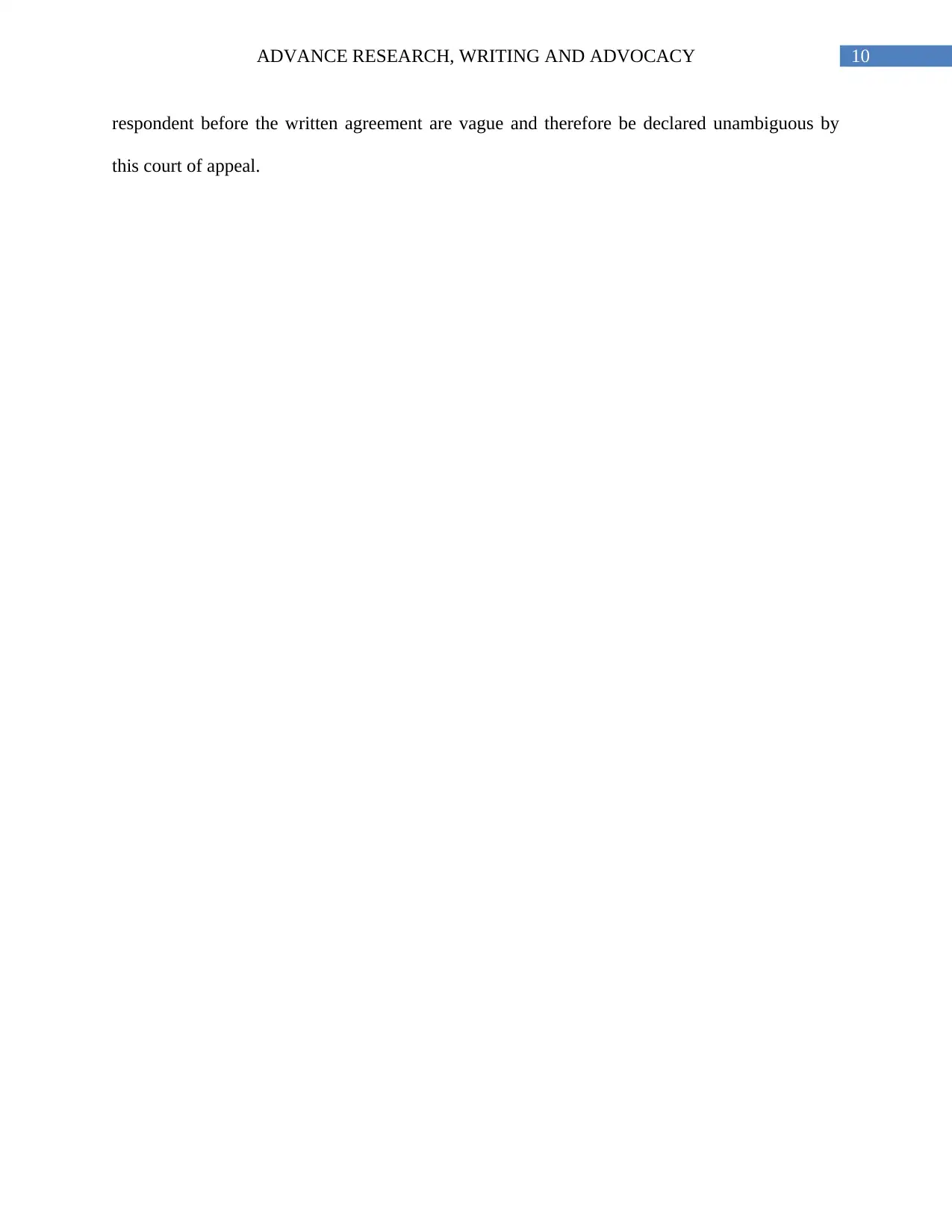
10ADVANCE RESEARCH, WRITING AND ADVOCACY
respondent before the written agreement are vague and therefore be declared unambiguous by
this court of appeal.
respondent before the written agreement are vague and therefore be declared unambiguous by
this court of appeal.
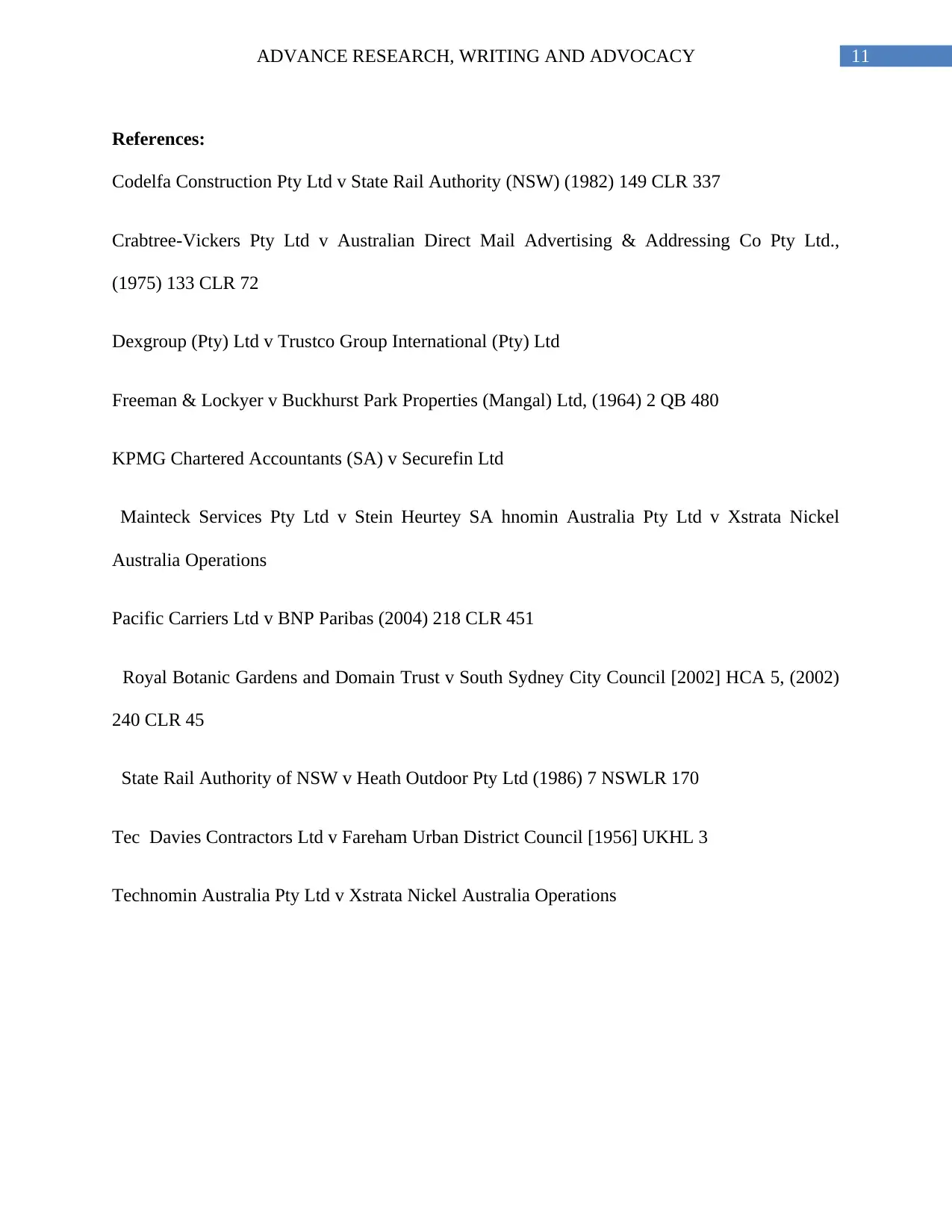
11ADVANCE RESEARCH, WRITING AND ADVOCACY
References:
Codelfa Construction Pty Ltd v State Rail Authority (NSW) (1982) 149 CLR 337
Crabtree-Vickers Pty Ltd v Australian Direct Mail Advertising & Addressing Co Pty Ltd.,
(1975) 133 CLR 72
Dexgroup (Pty) Ltd v Trustco Group International (Pty) Ltd
Freeman & Lockyer v Buckhurst Park Properties (Mangal) Ltd, (1964) 2 QB 480
KPMG Chartered Accountants (SA) v Securefin Ltd
Mainteck Services Pty Ltd v Stein Heurtey SA hnomin Australia Pty Ltd v Xstrata Nickel
Australia Operations
Pacific Carriers Ltd v BNP Paribas (2004) 218 CLR 451
Royal Botanic Gardens and Domain Trust v South Sydney City Council [2002] HCA 5, (2002)
240 CLR 45
State Rail Authority of NSW v Heath Outdoor Pty Ltd (1986) 7 NSWLR 170
Tec Davies Contractors Ltd v Fareham Urban District Council [1956] UKHL 3
Technomin Australia Pty Ltd v Xstrata Nickel Australia Operations
References:
Codelfa Construction Pty Ltd v State Rail Authority (NSW) (1982) 149 CLR 337
Crabtree-Vickers Pty Ltd v Australian Direct Mail Advertising & Addressing Co Pty Ltd.,
(1975) 133 CLR 72
Dexgroup (Pty) Ltd v Trustco Group International (Pty) Ltd
Freeman & Lockyer v Buckhurst Park Properties (Mangal) Ltd, (1964) 2 QB 480
KPMG Chartered Accountants (SA) v Securefin Ltd
Mainteck Services Pty Ltd v Stein Heurtey SA hnomin Australia Pty Ltd v Xstrata Nickel
Australia Operations
Pacific Carriers Ltd v BNP Paribas (2004) 218 CLR 451
Royal Botanic Gardens and Domain Trust v South Sydney City Council [2002] HCA 5, (2002)
240 CLR 45
State Rail Authority of NSW v Heath Outdoor Pty Ltd (1986) 7 NSWLR 170
Tec Davies Contractors Ltd v Fareham Urban District Council [1956] UKHL 3
Technomin Australia Pty Ltd v Xstrata Nickel Australia Operations
⊘ This is a preview!⊘
Do you want full access?
Subscribe today to unlock all pages.

Trusted by 1+ million students worldwide
1 out of 12
Your All-in-One AI-Powered Toolkit for Academic Success.
+13062052269
info@desklib.com
Available 24*7 on WhatsApp / Email
![[object Object]](/_next/static/media/star-bottom.7253800d.svg)
Unlock your academic potential
Copyright © 2020–2026 A2Z Services. All Rights Reserved. Developed and managed by ZUCOL.